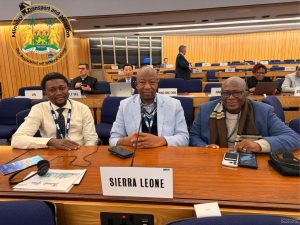NASSIT’s Efforts to Secure Workers’ Futures Highlighted at the Media Cocktail Event

On Thursday, November 14, 2024, the National Social Security and Insurance Trust (NASSIT) hosted a distinguished media cocktail at the Freetown Conference Centre. The event, attended by key stakeholders, was aimed at fostering a stronger partnership between NASSIT and the media, celebrating the organization’s successes, and discussing the future of social security in Sierra Leone. The gathering was a testament to NASSIT’s unwavering commitment to improving the lives of Sierra Leone’s workers through operational excellence and timely benefit payments.
The evening kicked off with a heartfelt welcome address by Mr. Kallon, the Executive Secretary of the Independent Media Commission (IMC). He underscored the vital role of the media in promoting transparency, accountability, and social responsibility in Sierra Leone’s institutions. In his remarks, Mr. Kallon highlighted that NASSIT’s efforts align with the media’s mission of providing timely and accurate information to the public. He also expressed appreciation for NASSIT’s collaborative approach with the media, acknowledging it as a powerful tool for engaging the public in meaningful dialogue about social security and economic empowerment.
“As stakeholders in this democratic society, we all share the same vision — to serve the people of Sierra Leone with integrity and transparency,” Mr. Kallon stated. He called on both the media and NASSIT to continue their partnership in building a better, well-informed society.
DG Fuad Daboh’s Vision for NASSIT

The Director General of NASSIT, Mr. Fuad Daboh, captivated the audience with a detailed reflection on the organization’s achievements. Since taking over leadership, Daboh has prioritized improving operational efficiency, increasing membership, and ensuring the timely payment of benefits. He began by expressing his gratitude to the media for their role in spreading awareness of NASSIT’s programs and for being key partners in ensuring that the public understands the importance of social security.
“NASSIT’s mission is to provide security and benefits to workers, especially in their retirement years. I am proud to share with you that, under our leadership, we have significantly grown our membership base to over 300,000 insured individuals,” Daboh said, adding that pensioners are now receiving their benefits punctually each month, well before the 25th.
Daboh’s speech also highlighted several strategic initiatives undertaken by NASSIT to modernize its operations. He pointed out the development of the NASHIP platform, which enhances communication between NASSIT and its members through digital channels, including social media. He also mentioned the ongoing digital transformation of NASSIT’s ICT systems, which has streamlined internal operations and improved customer service.
“Modernization is key,” Daboh emphasized. “Our new ICT infrastructure is transforming the way we engage with members, ensuring faster, more accurate services.”
Expanding Coverage for the Informal Sector
A significant part of Daboh’s address focused on NASSIT’s efforts to extend coverage to the informal sector, which has historically been underserved by traditional social security schemes. He shared updates on the progress of an expanded social security scheme, which began with voluntary participation for informal workers in 2005 but was hampered by low membership. However, recent efforts, including a partnership with the International Labour Organization (ILO), have led to the development of a more accessible scheme for the self-employed and informal sector workers.
“Expanding social security coverage to the informal sector is one of our top priorities,” Daboh affirmed. “We are working diligently with our partners to ensure that every worker, regardless of their employment status, can benefit from the protection that social security offers.”
The SEWA Ground Market Project
Another highlight of the evening was the announcement of the completion of the SEWA Ground Market Development Project. This initiative, aimed at creating a formalized platform for small-scale entrepreneurs and street traders, is designed to reduce informal trading in congested areas of Freetown while providing better working conditions for informal workers.
“The SEWA Ground Market will serve as a safe, regulated space for informal sector workers, allowing them to contribute to the formal economy and access social security benefits,” Daboh explained. The project is expected to help decongest key streets in the Central Business District and provide small business owners with a secure platform to operate.
NASSIT’s Commitment to Service and Compliance
Daboh also addressed the issue of compliance, noting that while NASSIT has made significant strides in improving its services, there remains a need for employers to adhere to the 2001 NASSIT Act, which mandates registration and contribution payments for all employees. He urged media institutions, in particular, to ensure they comply with the law in order to continue receiving payments for their services.
“To continue working together, we need the media to meet all necessary legal requirements, including NASSIT clearance certificates and valid registration,” Daboh emphasized, announcing that from now on, NASSIT would no longer pay for publications from institutions that do not comply with the statutory regulations.
SLAJ President’s Call for Accountability
SLAJ President, Ahmed Sahid Nasrallah, echoed Daboh’s call for media institutions to comply with the NASSIT Act. He reminded media owners of their responsibility to ensure their employees are registered with NASSIT and contributing to their social security. Nasrallah emphasized that compliance is not only a legal requirement but also a moral obligation to protect the welfare of media practitioners, many of whom face uncertainty in retirement without the benefits of social security.
“We, as media professionals, must set the example by adhering to the law,” Nasrallah urged. “This is about securing the future of those who work hard every day to inform and educate the public.”
Government Ministers Endorse Media and NASSIT Collaboration
The event also featured addresses from government officials, including the Minister of Information and Civic Education, Chernor Bah, and the Minister of Labour, Employment and Social Security, Mohamed Rado Swaray. Minister Bah commended NASSIT for its proactive approach to media engagement, stressing that NASSIT serves as a model for other government agencies in how to communicate effectively and transparently with the media.
Minister Swaray focused on the importance of employer compliance with the NASSIT Act, particularly within the media sector, where many workers remain unregistered. He urged media owners to register their employees with NASSIT and ensure they are contributing to the system.
“Ensuring compliance is crucial for the well-being of our workforce,” Swaray said. “Failure to register employees and pay contributions not only violates the law but also jeopardizes the social security of workers.”
Looking Forward: A Stronger Partnership
As the evening drew to a close, attendees left with a renewed sense of purpose and collaboration. The media cocktail event was a reminder of the critical role the media plays in promoting the social security system and the shared responsibility of all stakeholders to ensure the welfare of Sierra Leone’s workforce. With NASSIT’s commitment to transparency, modernization, and inclusion, the future of social security in Sierra Leone looks promising.
NASSIT’s collaboration with the media, along with continued support from government institutions, is key to ensuring that every worker—whether in the formal or informal sector—has access to the benefits and security they deserve.





